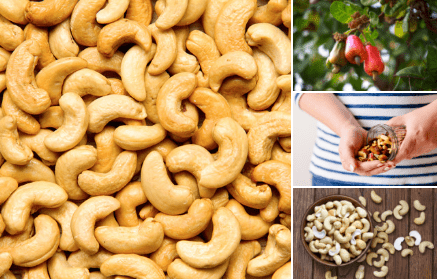Table of Contents
Cashew nuts have positive effects on our body across our entire body. Despite the fact that half of their composition is fat, they help us to lose weight. At the same time, they prevent the formation of gallstones and scientific studies have confirmed that they are an effective fighter against digestive tract cancer. Learn why cashews can rightly be called a superfood.
About the origin of the cashew nuts and a bit of history
The original cashews were bred in north-eastern Brazil, from where they were imported to Mozambique and the coast of India by Portuguese sailors during the 16th century. From India, cashews spread throughout Southeast Asia until they finally reached far Africa. When we talk about breeding cashews, they are actually growing on trees of Anacardium occidentale (the cashew tree). The tree is currently grown on plantations in tropical areas. It is doing well in parts of India, Brazil, Nigeria, Vietnam, Ivory Coast, Tanzania and Indonesia. The name ‘cashew’ comes from the Portuguese word ‘caju’, literally meaning ‘nut that produces itself’. [1]
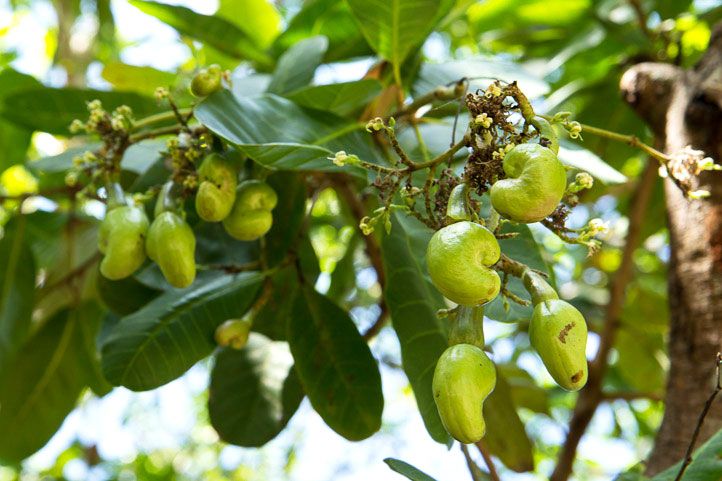
Cashew nuts are actually the fruit tree product
Drupe is found at the end of the cashew apple, which is the fruit of Anacardium occidentale tree. The tree can grow up to a height of 12 meters. Cashew grows directly on the apple tree and the pseudo-fruit in the shape of an apple grows up later. The vitamin C-rich apple itself has an acidic taste, so its consumption is more rare than normal. In some parts of the world, however, cashew apples are considered real delicacies, several medicinal properties are attributed to them and are eaten to combat various bacteria. This happens, for example, in Africa or Brazil. In the cashew nut shells there is phenolic resin and irritating salicylic acid, which behaves aggressively in contact with the skin. Shells are used, for example, for the production of wood varnishes. [1] [2]
You might be interested in these products:
Cashew nuts – Nutritional values and composition
Table 1: Nutritional values in 30 g portion of cashews [3]
| energy value | 733 kJ |
| calories | 175 kcal |
| protein | 5,24 g |
| carbohydrates | 7,79 g |
| of which sugars | 1,59 g |
| fats | 13,67 g |
| of which saturated fatty acids | 3,12 g |
| monounsaturated fatty acids | 7,78 g |
| polyunsaturated fatty acids | 2,22 g |
| dietary fibre | 0,63 g |
| water | 1,3 g |
| calcium | 9,75 mg |
Table 2: Vitamin content per 100 g portion of cashews [3]
| vitamin B1 (thiamine) | 0,62 mg |
| vitamin B2 (riboflavin) | 0,22 mg |
| vitamin B3 (niacin, niacinamide, nicotinamide, nicotinic acid) | 1,68 mg |
| vitamin B5 (pantothenol, pantothenic acid) | 1,15 mg |
| vitamin B6 (pyridoxin) | 0,38 mg |
| vitamin B7 (biotin, coenzyme R) | 12.7 mg |
| vitamin B9 (folic acid) | 0,04 mg |
| vitamin C | 0,5 mg |
| vitamin E (tocopherol) | 0,64 mg |
| vitamin K | 34,1 μg |
| potassium | 605 mg |
| fluorine | 0,14 mg |
| phosphorus | 445 mg |
| magnesium | 267,5 mg |
| iodine | 0,01 mg |
| cobalt | 0,01 mg |
| manganese | 1,27 mg |
| copper | 2,91 mg |
| molybdenum | 0,01 mg |
| selenium | 0,03 mg |
| sodium | 14,56 mg |
| calcium | 32,5 mg |
| zinc | 5,43 mg |
| iron | 4,2 mg |
Benefits of cashew nuts and health impact
1. Cashews reduce the risk of cardiovascular disease
Regular consumption of cashews can reduce the risks associated with heart disease, high cholesterol, high blood pressure or obesity. Nuts also have a positive effect on stress management, treatment of inflammation, or vascular and arterial activity that promotes healthy heart function. [4]
2. They help fight cholesterol
Cashew nuts can lower the level of “bad” LDL cholesterol and improve “good” HDL cholesterol. Nuts contain phytosterol compounds that stabilize cells and prevent cholesterol absorption. [4]
3. They prevent the formation of gallstones
Eating nuts, including cashew, reduces the risk of stones in the gallbladder. The disease results from supersaturation of the bile with cholesterol, which circulates throughout the entire digestive tract. In the case of liver problems, the risk of developing gallstones is even greater because the cholesterol released acts as an adhesive to which other substances (eg calcium) bind inside the gallbladder. [5]
4. They have a high fat content but still help to lose weight
Nuts have a high fat content, in the case of nut cashews it is almost 46% (Chart 1). At the same time, they are rich in other nutrients, containing a number of minerals and fatty acids that promote weight loss. Cashews will feed you and after eating you will feel full enough to forget the unnecessary overeating and consumption of fast but very unhealthy snacks. Fats in foods enhance the satiety of foods and increase the absorption of fat-soluble nutrients and minerals (for example, vitamin A and vitamin D). The results of scientific studies have shown that people who eat nuts at least twice a week have a significantly lower risk of increased body weight than those who do not eat nuts at all. [1] [6]

5. Already 2 portions per week can reduce the risk of cancer
Regular consumption of nuts, including cashews, is associated with a lower risk of cancer, especially in the digestive tract (liver cancer and colon cancer). Nuts are an excellent source of antioxidants. The British Institute for Cancer Research analysed the effect of nut consumption (almonds, para nuts, cashews, hazelnuts, walnuts, pistachios, pecans and pine nuts) on pancreatic cancer. The results showed that women who ate two or more portions of nuts per week had a significantly lower incidence of the disease. [7]
6. They are a great source of vitamin K, which is important for bones
Cashews contain calcium, magnesium and potassium – that is, a large number of substances needed to maintain healthy bones that prevent bone demineralization. In addition, cashews are a great source of vitamin K and already 1/4 cup of cashew provides more than 12% of the recommended daily dose of this vitamin. Vitamin K together with calcium keeps bones in shape, provides them with sufficient mineralization and protects them from fractures or osteoporosis. [1]
7. They promote healthy brain function
Proper brain function is dependent on a stable supply of healthy fatty acids from food. Nuts, including cashews, are one of the most natural vegetable foods rich in fats. As a result, they support cognitive functions of the brain, cognitive capabilities of brain processes and mood control. Lack of monounsaturated (MUFA) and polyunsaturated (PUFA) fatty acids can lead to mental disorders, anxiety, depression, dyslexia or even dementia. [8]
8. They reduce the risk of diabetes
Cashew nuts are a rich source of monounsaturated fats (MUFA) that slow the release of blood into the bloodstream. The anti-diabetic properties of cashews work thanks to hydro-ethanolic substances in the form of anarcadic acid, which controls the spread of glucose in the body. Sufficient cashew intake also helps prevent arterial hypertension (blood pressure greater than 140/90). [9]

9. They protect against unpleasant headaches
In addition to promoting healthy brain function, improving blood circulation while taking care of lowering blood pressure, cashews also contain phytosterols that reduce the duration of headaches. Hypoglycaemia is a well-known trigger of migraine and is also an effective tool in combating headaches caused by sudden changes in blood sugar. [10]
10. Essential fatty acids promote healthy skin
The presence of fats in the cashew keeps the skin hydrated enough and the fatty acids protect it from aging without any irritation. In addition to fats, cashews are also an excellent source of copper, which plays an important role in pigment and collagen production. They take care of elastic skin and healthy hair. [1]
11. Cashew nuts reduce high blood pressure due to magnesium content
The presence of magnesium in the cashew nut has positive effects in the fight against increased blood pressure. [11]
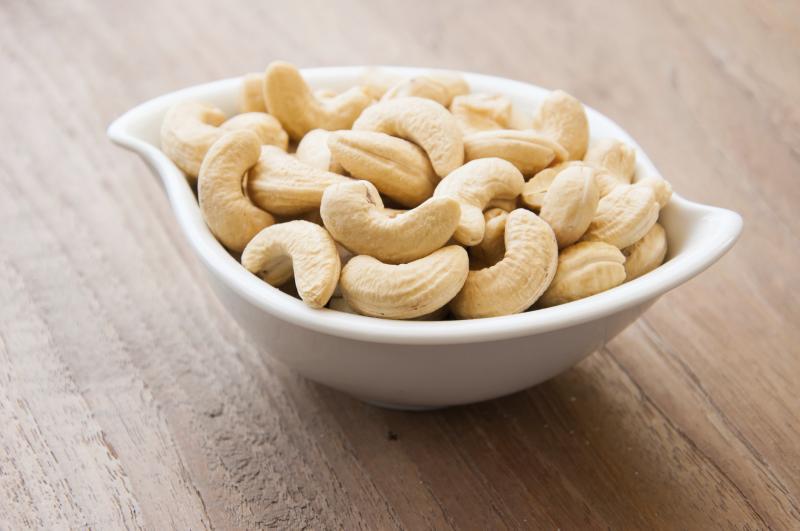
12. They contain a large amount of vitamins
They are a great source of protein, minerals, magnesium, iron and zinc, thus providing vegetarians with a sufficient intake of all necessary substances. [12]
13. They maintain healthy gums and neutralize bacteria in the oral cavity
Eating cashews helps maintain healthy gums and teeth. Cashews also have positive effects for the oral cavity. Their chewing causes excessive saliva production, which neutralizes streptococcal bacteria in the mouth. In addition, nuts massage the gums and cleans otherwise hard to reach areas between the teeth. [13]
14. They protect against macular degeneration
Cashew nuts provide a number of substances needed to create a natural UV filter that protects the eyes from macular degeneration. The disease affects the central part of the retina and causes visual impairment, in some cases blindness. [14]
In a closed container and in a cool place, fresh cashew nuts can last even for 6 months
In the offer of stores, you can find cashews in many forms – raw, salted, sweetened or candied. Healthy and flawless nuts should have a light creamy colour without cracks, mould, stains and musty odour. At household, you should store cashews in an airtight container in a cool, dark place, ideally in a refrigerator. The cashews stored in this way retain their freshness for 5 to 6 months. [15]
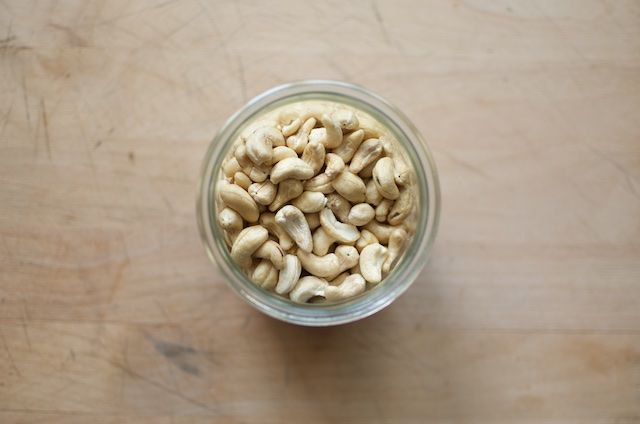
Allergic reactions to cashews occur most frequently in children
Some people may experience an allergic reaction when consuming cashews, but small children are the riskiest group. Symptoms of an allergic reaction to cashew nuts include slight itching of the skin, so-called urticaria (hives), difficulties with breathing, abdominal pain, vomiting and diarrhoea. Allergic manifestations are caused by anacardic acid. However, similar allergic reactions may also occur when consuming mangoes or pistachios that also contain anarcadic acid. Some studies have shown that cashew allergy prevails in children and women, especially in Asia. [16] [17]
Cashew nuts have a wide range of uses in the kitchen
In the raw state, cashews contain many substances that have a positive effect on our health. At the same time, it is when they taste the best. You can consume them in the morning, as a snack or in the evening. If you are unexpectedly surprised by strange sounds from the abdomen, they will serve as a substitute for fast food for immediate feeding. Along with other nuts, they are a popular crumble of sweet desserts, cakes and fruit bowls. Together with almonds and other dry fruits, they are often combined with rice in Indian, Thai and Chinese cuisine. There are a few quick and healthy recipes with cashew nuts, such as cashews with roasted rice, rosemary and tomato.
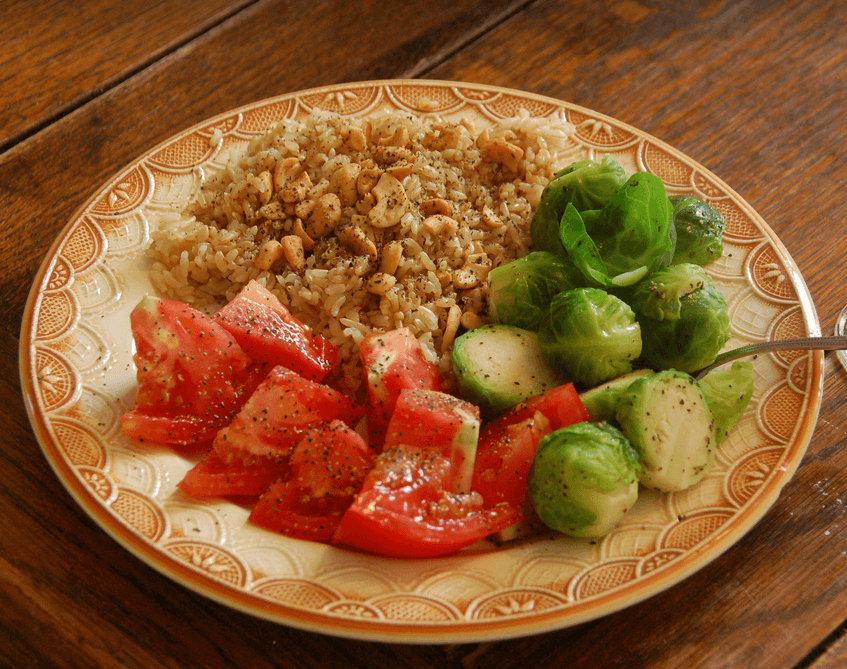
All benefits can be spread on bread or mixed into food and drinks
Cashew nut butter is a healthy and very popular ingredient in the kitchen. The natural sweet taste of butter without added sugars, salts and fats is suitable for many sweet and savoury recipes. If you don’t want to chew cashew nuts as a snack, you can spread the butter made of them on any kind of bread or mix them into your favourite protein drinks. In the kitchen, cashew nut butter is also used as an ingredient in a variety of pan-cooked dishes. Cashew butter is at the same time a healthy supplement to the diet and after its consumption you can forget about any remorse.
[1] Axe, J. Cashews Nutrition: Helps Prevent Cancer, Diabetes & More – https://draxe.com/nutrition/cashews-nutrition/.
[2] Ftorek, M. Obličkovec Západný (Anacardium Occidentale L.). – https://www.citrusar.sk/orechy/kesu.html.
[3] Kalorické tabulky – ořechy kešu. – https://www.kaloricketabulky.cz/kesu-jadra-natural/.
[4] Ros, E. Health Benefits of Nut Consumption. – https://www.ncbi.nlm.nih.gov/pmc/articles/PMC3257681/.
[5] Shaffer, E., A. Gallstone disease: Epidemiology of gallbladder stone disease. 2006. University of Calgary.ca. – https://www.ncbi.nlm.nih.gov/pubmed/17127183.
[6] Bes-Rastrollo, M. Nut consumption and weight gain in a Mediterranean cohort. 2007. University of Navarra : Department of Preventive Medicine and Public Health. – https://www.ncbi.nlm.nih.gov/pubmed/17228038.
[7] Bao, Y. Nut consumption and risk of pancreatic cancer in women. 2013. British Journal of Cancer. – https://www.nature.com/bjc/journal/v109/n11/full/bjc2013665a.html.
[8] Pinilla, G., F. Brain foods: the effects of nutrients on brain function. 2008. Nat Rev Neurosci. – https://www.ncbi.nlm.nih.gov/pmc/articles/PMC2805706/.
[9] Tedong, L. Hydro-ethanolic extract of cashew tree (Anacardium occidentale) nut and its principal compound, anacardic acid, stimulate glucose uptake in C2C12 muscle cells. Mol Nutr Food Res. 2010. – https://www.ncbi.nlm.nih.gov/pubmed/20603833.
[10] Leira, R., Rodriguez, R. Diet and migraine. 1996. Rev Neurol. – https://www.ncbi.nlm.nih.gov/pubmed/8681169.
[11] Natural News. Cashews boost blood-pressure-regulating reflex. 2006. – https://www.naturalnews.com/020005_nuts_diet_blood.html.
[12] Torrens, K. The health benefits of... nuts. 2014. BBC Goog Food. – https://www.bbcgoodfood.com/howto/guide/health-benefits-nuts.
[13] The Times of India. Go nuts for healthy teeth. 2006. – https://timesofindia.indiatimes.com/life-style/health-fitness/health-news/Go-nuts-for-healthy-teeth/articleshow/4520161.cms?.
[14] Tadayyon, B. The Miracle of Nuts, Seeds and Grains: The Scientific Facts about Nutritional Properties and Medical Values of Nuts, Seeds and Gains. 2013. ISBN 978-1-4836-6176-6. – https://books.google.co.in/books?id=m2YeAwAAQBAJ.
[15] Perkins, S. How to Store Raw Almonds & Cashews. 2015. – https://www.livestrong.com/article/556826-how-to-store-raw-almonds-cashews/.
[16] Nutrition and You. Cashew nut nutrition facts. – https://www.nutrition-and-you.com/cashew_nut.html.
[17] Valk, Der, Van, P., J. Systematic review on cashew nut allergy. 2014. John Wiley & Sons Ltd. – https://www.ncbi.nlm.nih.gov/pubmed/24734868.

